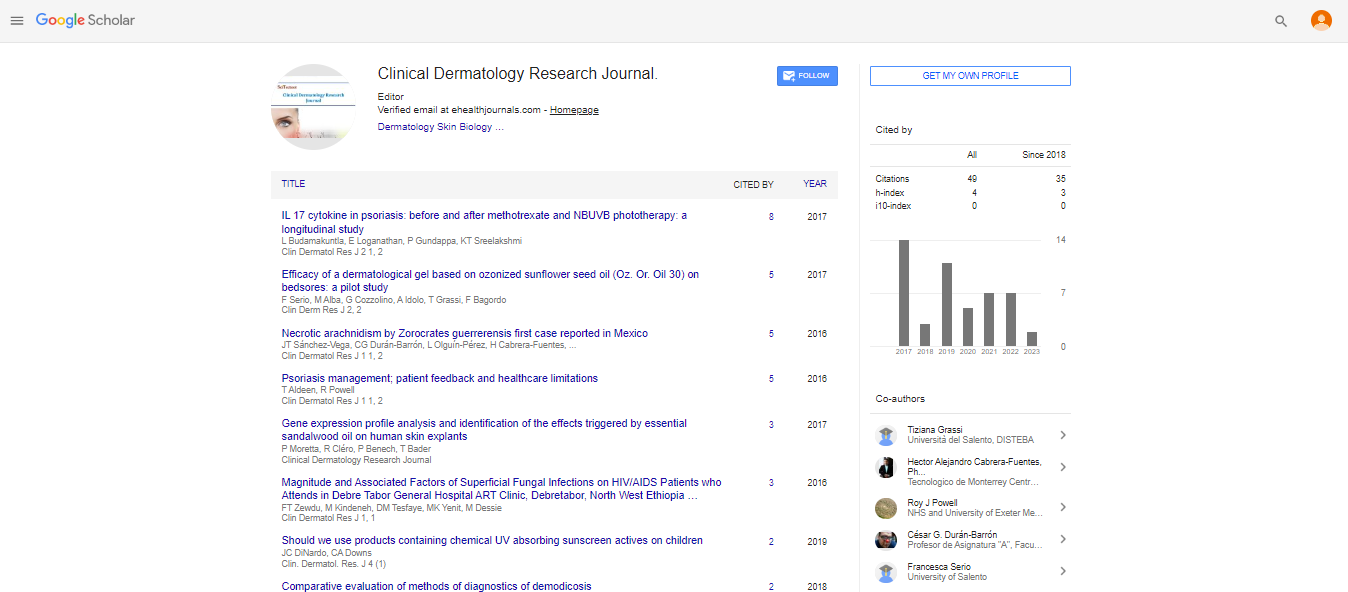Opinion Article, Vol: 8 Issue: 4
Counterfeit Medications: A Growing Threat to Tuberous Sclerosis Management
Raj kumar*
1Department of Dermatology, Skin Research Institute of Singapore, Agency for Science Technology & Research, Singapore
*Corresponding Author: Raj kumar,
Department of Dermatology, Skin Research
Institute of Singapore, Agency for Science Technology & Research, Singapore
E-mail: Rajkumar45@sris.a-star.edu.sg
Received date: 27 May, 2023, Manuscript No. CDRJ-23-104526;
Editor assigned date: 29 May, 2023, Pre QC No. CDRJ-23-104526(PQ);
Reviewed date: 15 June, 2023, QC No. CDRJ-23-104526;
Revised date: 23 June, 2023, Manuscript No. CDRJ-23-104526 (R);
Published date: 30 June, 2023, DOI: 10. 4172/2576-1439.1000203
Citation: Kumar R (2023) Counterfeit Medications: A Growing Threat to Tuberous Sclerosis Management. Clin Dermatol Res J 8:2.
Description
Tuberous Sclerosis (TS) is a complex genetic disorder that affects multiple organ systems, leading to various clinical manifestations. The management of TS often involves a combination of medications to control symptoms and improve the quality of life for affected individuals. However, the availability of counterfeit medications poses a significant threat to patient safety and effective treatment. This explores the impact of counterfeit medications on individuals with tuberous sclerosis, highlighting the potential dangers and emphasizing the need for increased awareness, stringent regulatory measures, and enhanced patient education to combat this growing problem.
Tuberous Sclerosis (TS), also known as Tuberous Sclerosis Complex (TSC), is an autosomal dominant genetic disorder characterized by the formation of benign tumors in various organs, including the brain, heart, kidneys, lungs, and skin. This multisystem disorder affects approximately 1 in 6,000 individuals worldwide and often presents with a wide range of clinical manifestations. While the exact etiology of TS remains elusive, mutations in the TSC1 and TSC2 genes have been identified as the primary genetic cause. Management of TS typically involves a multidisciplinary approach, including medications to control seizures, manage behavioral issues, and shrink or stabilize tumors. However, the proliferation of counterfeit medications poses a significant risk to patients, jeopardizing their safety and potentially undermining the efficacy of treatment.
Counterfeit medications are illegitimate pharmaceutical products that are intentionally mislabeled or misrepresented in terms of their identity, composition, or source. The global trade in counterfeit drugs has witnessed an alarming increase in recent years, posing a grave threat to public health. Counterfeit medications may contain substandard or ineffective ingredients, incorrect dosages, or toxic substances. The manufacturing, distribution, and sale of counterfeit medications are often linked to organized crime networks, taking advantage of the high demand for affordable medications.
For individuals with tuberous sclerosis, the use of counterfeit medications can have severe consequences. Antiepileptic drugs, such as phenytoin or carbamazepine, are commonly prescribed to manage seizures in TS patients. Inadequate seizure control due to counterfeit antiepileptic drugs can lead to increased seizure frequency, impaired cognitive function, and decreased quality of life. Similarly, counterfeit medications used to treat renal complications or behavioral symptoms associated with TS may have suboptimal efficacy or even harmful effects.
The use of counterfeit medications in the management of tuberous sclerosis poses several risks and challenges. Firstly, the lack of quality control and adherence to manufacturing standards means that counterfeit drugs may contain incorrect or inactive ingredients, compromising their therapeutic efficacy. Patients with TS require precise dosing and consistent medication potency to maintain seizure control and manage other symptoms effectively. Counterfeit medications can disrupt the delicate balance achieved with legitimate treatments, leading to inadequate symptom management and disease progression.
Secondly, counterfeit medications may harbor toxic substances or contaminants that can have detrimental effects on patients' health. These substances can exacerbate existing symptoms, cause adverse drug reactions, or even result in life-threatening complications. The consequences can be particularly severe in patients with compromised organ function, such as renal impairment, common in TS patients.
Furthermore, the proliferation of counterfeit medications undermines trust in healthcare systems and pharmaceutical manufacturers. Patients may unwittingly purchase counterfeit drugs from unverified sources, such as online marketplaces or unauthorized distributors, due to financial constraints or lack of awareness. The resulting distrust can hinder patients from seeking appropriate medical care and complying with prescribed treatment regimens.
 Spanish
Spanish  Chinese
Chinese  Russian
Russian  German
German  French
French  Japanese
Japanese  Portuguese
Portuguese  Hindi
Hindi 

